
Microsoft Power BI is a frequent contender as the platform of choice that empowers nontechnical business users to find their own actionable solutions. Power BI owes its favored status to more than just the market penetration of its parent company Microsoft. It’s a powerful tool in its own right. Power BI is easy to get started with, it has a large and active support community online and it integrates easily with other Microsoft tools like Excel that users tend to have some experience with.
Regardless of merit, there are times when Power BI isn’t right for you or your team. Whether your concerns are around licensing, performance or something else entirely, there is no shortage of business intelligence platform options. Below are a few of the main Power BI competitors, with some highlighted strengths to aid you in your decision.
Jump to:
| Software | Real-time analytics | Data visualization | Embedded analytics | Native mobile support | Free version | Starting price for paid tiers |
|---|---|---|---|---|---|---|
| Power BI | Yes | Yes | Yes | Yes | Yes | $10 per user per month |
| Tableau | Yes | Yes | Yes | Yes | No | $15 per user per month |
| Sigma | Yes | Yes | Yes | No | No | Contact for quote |
| Qlik | Yes | Yes | Yes | Yes | No | $20 per user per month |
| AWS QuickSight | Yes | Yes | Yes | Yes | No | $9 per user per month |
| Looker | Yes | Yes | Yes | Yes | Yes | Contact for quote |
| Domo | Yes | Yes | Yes | Yes | No | Contact for quote |
| Sisense | Yes | Yes | Yes | Yes | No | Contact for quote |
Tableau is no slouch in the BI space. A frequent competitor to Power BI in the enterprise, Tableau offers similar features and ease of use, with a slightly different take on the syntax and makeup of the underlying calculation model. It’s known for its strong data visualization capabilities; plus, it’s highly scalable, capable of handling large volumes of data and offers both cloud and on-premises deployment options. However, it comes at a higher price tag than Power BI.
Tableau offers a range of pricing options for teams, namely Tableau Viewer for $15, Tableau Explorer for $42 and Tableau Creator for $75, all per user per month when billed annually.
Figure A
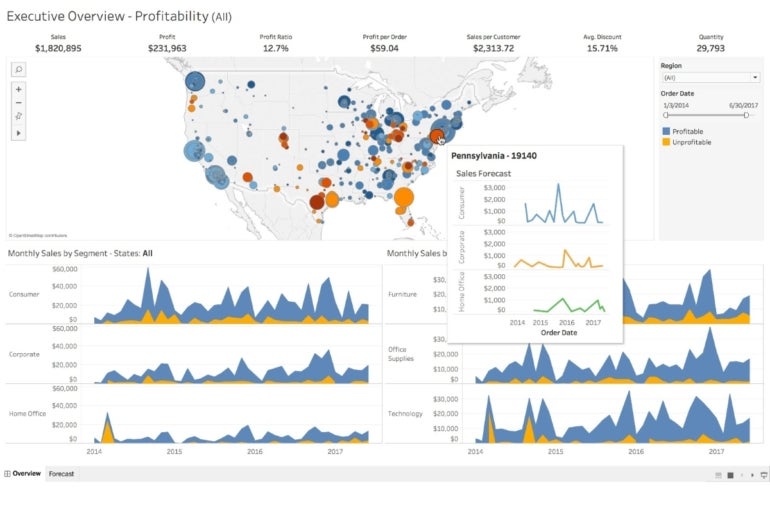
Tableau sets itself apart with data visualization capabilities that go past aesthetics to offer deep data exploration while remaining intuitive enough to maintain the flow of data analysis processes. Additionally, its deployment options are flexible — be it cloud, on-premises or Salesforce CRM integration — and it incorporates AI and machine learning capabilities to offer intelligent analytics at scale.
SEE: Discover more on how Tableau compares to Power BI.

Sigma is a cloud-native analytics platform that excels in delivering real-time analytics and ease of use. Its intuitive spreadsheet-like interface in particular emphasizes its ease of use, as it allows both technical and non-technical users to explore and analyze data effortlessly. Sigma is highly scalable as it can analyze billions of rows of data. If your business needs instant, data-driven decisions without the need for writing code, you should consider Sigma.
Sigma encourages prospective clients to contact them for a quote, as its pricing information is not publicly listed. Sigma, however, offers both a demo and a free trial.
Figure B
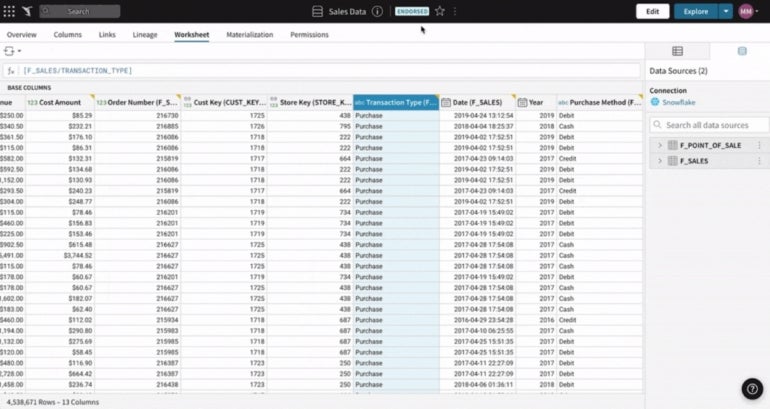
Sigma’s real-time data insights and user-friendly interface stand out as it delivers insights really fast while being usable by both technical and non-technical users. Plus, it is capable of handling large data sets that users can explore without special training with ease. The platform also places a strong emphasis on security.

Qlik is a mature player in the BI space. The current product, Qlik Sense, is the successor of its original analytics tool, QlikView. According to Wikipedia, Qlik has been pioneering this field since 1993, so it’s no surprise Qlik products are well known in the BI world. The current generation of Qlik BI tools focuses on data exploration, which means they shine when it comes to things like querying the data and attaching to live data sources.
Qlik’s cloud analytics products have three pricing plans:
Figure C
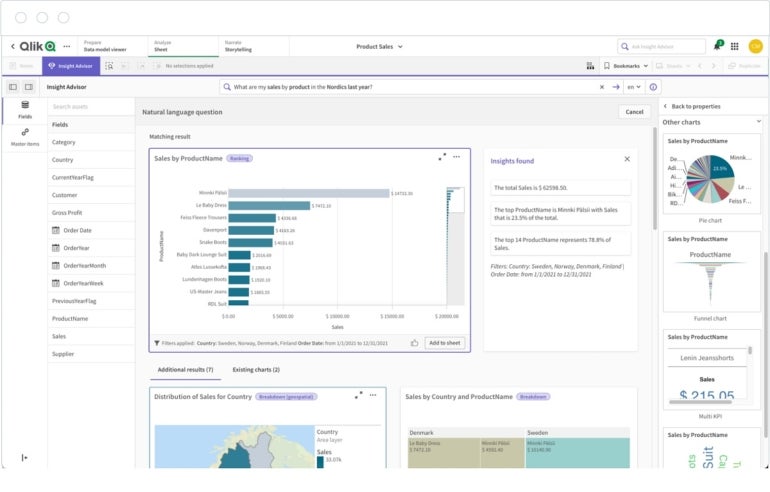
The way Qlik integrates AI and machine learning to offer smarter, auto-generated insights and predictions makes sure it delivers a continuous state of intelligence. Qlik is made to deliver real-time information to ensure that teams get immediate insights and act on them in a timely fashion.
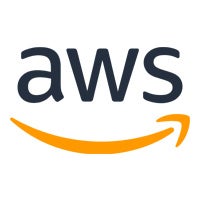
While less citizen developer-friendly than some of the other Power BI alternatives mentioned here, AWS QuickSight deserves a mention because it is both cloud native and entirely serverless. That means it has instant scale and no hardware or software for you to manage. It also naturally integrates well with other Amazon web services if you are already on board the AWS train.
AWS QuickSight offers two editions; Enterprise and Standard, where Enterprise starts at $18 per user per month when billed annually and Standard at $9 per user per month with an annual subscription.
Figure D
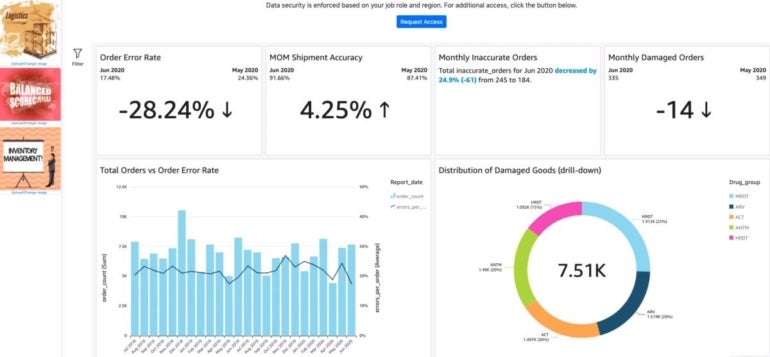
AWS QuickSight is a natural fit for businesses already using AWS services, offering a unified and cost-effective data analytics solution. Its Generative BI capabilities make complex BI tasks much easier. Its automatic scaling is key for businesses that expect to grow or have fluctuating usage, as it eliminates the need for manual server management. QuickSight’s usage-based pricing model also offers a cost-effective solution for deployments of all sizes.

Formerly Google Data Studio, Looker is a modern business intelligence platform that carries on Data Studio’s visualization and data storytelling through its visual approach to creating reports and dashboards. Being entirely browser-based, there is no installation or setup, and the user interface is straightforward so long as you don’t need to do a lot of data transformation or sanitation.
Looker Studio is free for creators and report viewers. However, enterprise customers will need to contact Google for pricing information for Looker Studio Pro.
Figure E
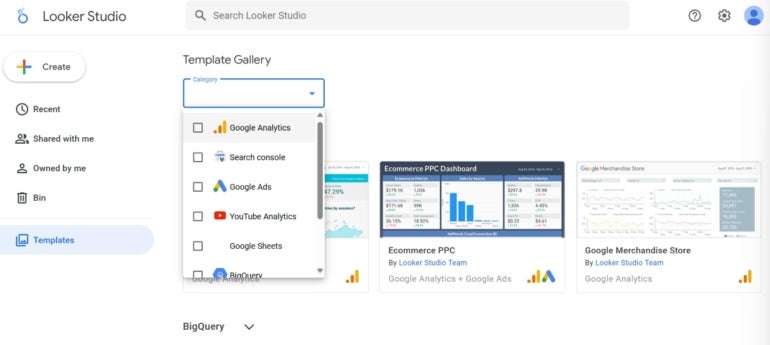
Looker is easy to pick up and use straight away, provided you have a Google account. You can instantly create reports, select connectors built by Google, select from more than 800 connectors created by Looker’s partners and explore data. Its dashboards are simple to use and the fact that it also has many templates for multiple Google products makes it easy to use within the Google ecosystem.

Domo is a business intelligence platform whose strengths lie in business process automation and real-time decision-making. It offers low-code and pro-code apps to automate business insights, enabling faster and more informed decisions. Its advanced visualizations and AI & data science capabilities further enhance its analytics offerings.
Domo’s pricing is not publicly disclosed so prospective users will have to contact Domo.
Figure F

Domo is a comprehensive platform with features ranging from data integration to app creation. Its app creation tools are particularly fascinating as they help businesses build low-code and pro-code apps to automate insights and make faster decisions. Domo’s offers more than a thousand connectors and built-in, drag-and-drop ETL.

Sisense is a leading BI tool that excels in handling large datasets and offers both cloud-based and on-premise solutions. Known for its Elasticube technology, Sisense allows users to take data snapshots and offers well-designed dashboards with a variety of widgets and chart types.
Sisense pricing is available only by custom quote.
Figure G
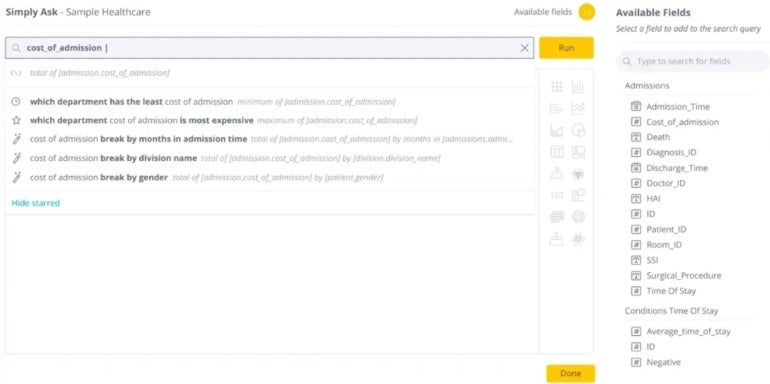
Sisense stands out for its ability to handle large datasets efficiently, thanks to its columnar database approach and its Elasticube™ technology that speeds up data retrieval. While it does require some technical expertise to fully utilize, it remains an excellent choice for businesses dealing with large volumes of data.
SEE: Dive deeper into how Sisense stacks up against Power BI.
Real-time analytics is crucial for businesses that require immediate insights for decision-making. This feature allows organizations to analyze data as it is ingested into the system, providing up-to-the-minute information. Power BI’s dashboards can be refreshed in real-time.
With effective data visualization tools, you can transform raw data into meaningful insights through dashboards, charts and graphs. Data visualization makes data understandable and actionable. Power BI is well known for its strong data visualization capabilities through its vast, customizable charts and graphs.
Embedded analytics integrate directly into business applications, allowing users to access data insights without leaving the application. Businesses that want to offer analytics capabilities within their products or services need to have this feature. Power BI has great embedded analytics capabilities as it is integrable with not only other Microsoft products but also various third-party applications.
With the increasing need for remote work and on-the-go data access, mobile support is becoming a must-have feature. Users can access dashboards and reports from their mobile devices, ensuring that they can make informed decisions no matter where they are. You can access Power BI on the go as it provides apps for both Android and iOS.
SEE: Check out this mobile device computing policy from TechRepublic Premium.
Cloud-native tools are designed to run in a cloud environment, offering scalability and flexibility. This feature is key for organizations that want to be able to scale their operations without worrying about how infrastructure would limit them.
Whether you think Power BI is worth it largely depends on your business needs and the complexity of the data you’re handling. Power BI has an extensive set of features for data analytics and visualization, especially for businesses already invested in the Microsoft ecosystem. However, it may not be the best fit for all organizations, particularly those looking for more customization.
Ultimately, whether you need an alternative to Power BI will come down to specific use cases and personal preference. While Power BI is a great solution, especially for those already using Microsoft products, it won’t meet the needs of all organizations.
For instance, smaller businesses may find the licensing costs prohibitive, or you may require advanced visualizations or specific integrations that Power BI doesn’t offer. In such cases, exploring alternatives can provide you with the flexibility and features that are a much better fit for your organization.
All the alternatives listed above have some kind of trial or demo license available. So why not narrow it down to a couple and then take them for a test drive?
To deliver this list of alternatives, we examined Power BI to understand its features and pricing and selected its alternatives based on their unique use cases and popularity amongst certified users. We then compared their features to those of Power BI to see how similar and how different they are. Then we compared their pricing to determine their cost effectiveness in comparison to Power BI.